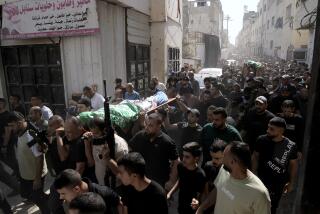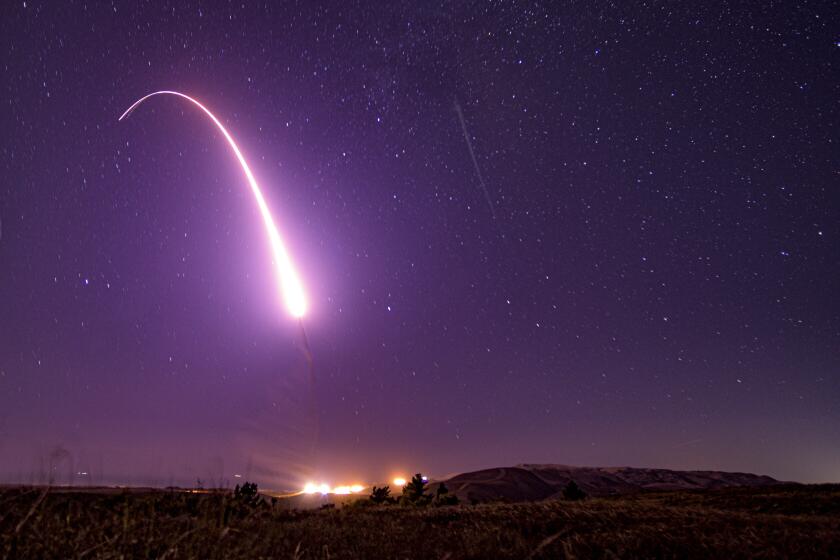Ortega Rejects Talks on 2 Rival Contra Truce Plans : Says He’s Drafting His Own Peace Proposal to Be Submitted to Washington After Bush Takes Office
- Share via
MANAGUA, Nicaragua — Faced with two rival armistice proposals from the U.S.-backed Contras, President Daniel Ortega on Saturday ruled out talking with either rebel faction but said he is preparing his own peace offer for direct negotiations with the United States.
In a year-end speech, Ortega boasted that the Sandinista revolution, midway through its 10th year, had survived eight years of hostility from the Reagan Administration. But he said that until Washington dismantles the largely idled Contra army, Nicaraguans will have no peace.
“The Contra is dead,” he declared. “But the corpse has not been buried. It is creating a stench.”
Ortega spoke before ranks of Sandinista soldiers standing under a tropical sun at the Omar Torrijos Tank Battalion headquarters in Managua. Behind the soldiers was a row of 12 Soviet-made T-55 tanks, and behind Ortega was a sign bearing the Sandinista slogan of 1989: “Year of the Tenth Anniversary. The Revolution Stays!”
Peace Plan Outlined
In a lengthy interview published Saturday in Barricada, the Sandinista newspaper, Ortega sketched a rough outline of the peace plan that he said he will offer after President-elect George Bush takes office in three weeks.
The plan, based on previous Sandinista proposals, calls for parallel negotiations by Nicaragua with its four neighbors and with United States. It aims to phase out foreign military bases and advisers in Central America, reduce the sizes of national armies in the region and enforce a ban on guerrilla warfare.
“This will take into account all the security issues that worry the United States,” Ortega said in the interview, referring to the Sandinistas’ reliance on Soviet Bloc military advisers, its 85,000-person army and its alleged support for Marxist rebels in El Salvador.
Since 1985, when talks between Washington and Managua broke down, President Reagan has insisted that the Sandinistas negotiate peace with the Contras. The warring Nicaraguan armies agreed to a cease-fire last March, but talks on a final armistice broke down in June. Most of the 10,000-man rebel army, still fed by the United States but deprived of new military aid, has since retreated to camps along the Honduran border.
Leadership Division
The weakened insurgency suffered a leadership split last week when Alfredo Cesar, the Contra director most eager to resume negotiations, asked the Sandinistas to allow two envoys to carry his own peace plan to Managua in early January.
But when Cesar asked his six colleagues on the rebel directorate to support the plan, a different proposal emerged from its most hawkish members. Transmitted to the Sandinista government Friday, it was signed by Aristides Sanchez, Adolfo Calero, Roberto Ferrey and the rebel military commander, Enrique Bermudez.
Both plans aim to resume talks on Contra proposals similar to ones that Ortega rejected last June. They call for sweeping constitutional changes to break the Sandinistas’ grip on political and economic power. But there are differences.
Cesar’s plan is more flexible than that of his rivals, which sets a 70-day deadline for “democratizing” Nicaragua. Cesar seeks support in advance for his plan from Central American leaders; the rival proposal does not.
A spokesman for Cesar, Jose Davila, said Saturday in Costa Rica that the two plans “are not incompatible” and that Cesar is trying to get them melded into one.
But the emergence of two public proposals exasperated State Department officials who work with the Contras. One U.S. official said the rebel leadership appears to be “falling apart” over the issue of talks.
The feuding has given the Sandinistas an argument to ignore the insurgency. Foreign Minister Miguel d’Escoto said Saturday that the Contras “had an opportunity to negotiate” last spring, but “they blew it.”
“What one Contra faction or the other says has no credibility,” Ortega said in his speech. “We don’t really know which one is the real proposal of the United States, who armed this monster, which is now dead, and must decide whether or not to bury it.”
Not Subject to Talks
Ortega said internal political issues broached in the Contra peace talks last spring, including Sandinista party control of the army, are not subject to negotiation with the United States. But he said Nicaragua is willing to allow its political system to be monitored by outside groups chosen by the five Central American presidents.
“If the Contras want a program of democratization, let them come home, accept amnesty and learn what democracy is,” the Sandinista leader said. “They can learn a lot from us.”
The war that all but ended this year has cost 29,113 Nicaraguan lives and $12.2 billion in economic losses, Ortega said. Inflation has soared beyond 20,000% this year, he admitted, largely because of deficit spending on its large army. He said that defense spending must be maintained until Washington comes to terms with the Sandinistas.
Calling Bush’s intentions toward Nicaragua uncertain, he said: “The United States is not going to follow a policy of support for the revolution. It is going, perhaps, to look for other ways to destroy it.”
“We must keep our guard up,” he added.
More to Read
Sign up for Essential California
The most important California stories and recommendations in your inbox every morning.
You may occasionally receive promotional content from the Los Angeles Times.









